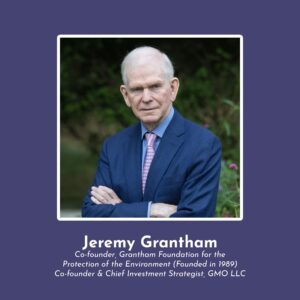
Ep 155 | Jeremy Grantham
Jeremy Grantham: “The Baby Bust: How The Toxicity Crisis Could Cause the Next Economic Crash”
Show Summary
It is no secret that population dynamics significantly impact global stability. But what’s really behind today’s shifting global birth trends, the increased need for medically-assisted pregnancy, and the changing age demographics of industrialized nations? Furthermore, what are the implications of these shifts for future economic security?
Today, Nate is joined by investment strategist Jeremy Grantham to discuss the critical but underreported issues surrounding toxicity and public health – particularly endocrine disruptors and their impact on human fertility, longevity, and societal structures.
In this important conversation, Jeremy highlights the ubiquitousness of toxicity in our modern environments, the cultural and economic factors contributing to declining fertility rates, and the urgent need to transition to non-toxic materials and energy sources.
In what ways could population decline pose serious economic challenges, particularly in aging societies? How might the alarming drop in sperm count affect future policies on immigration? Finally, how can we detoxify both our environments – and capitalism – before it’s too late?
About Jeremy Grantham
Jeremy Grantham co-founded GMO in 1977 and is a member of GMO’s Asset Allocation team, serving as the firm’s long-term investment strategist. He is a member of the GMO Board of Directors, a partner of the firm, and has also served on the investment boards of several non-profit organizations. Additionally in 1989, Jeremy co-founded the Grantham Foundation for the Protection of the Environment. Prior to GMO’s founding, Mr. Grantham was co-founder of Batterymarch Financial Management in 1969 where he recommended commercial indexing in 1971, one of several claims to being first. He began his investment career as an economist with Royal Dutch Shell. Mr. Grantham earned his undergraduate degree from the University of Sheffield (U.K.) and an MBA from Harvard Business School. He is a member of the Academy of Arts and Sciences, holds a CBE from the UK and is a recipient of the Carnegie Medal for Philanthropy.
In French, we have a motto that says that a simple drawing is often better than a long explanation. Jean-Marc Jancovici Carbone 4 President
That’s very understandable because with left atmosphere thinking, one of the problems is that you see everything as a series of problems that must have solutions. Iain McGilchrist Neuroscientist and Philosopher
We can’t have hundreds and hundreds of real relationships that are healthy because that requires time and effort and full attention and awareness of being in real relationship and conversation with the other human. Nate Hagens Director of ISEOF
This is the crux of the whole problem. Individual parts of nature are more valuable than the biocomplexity of nature. Thomas Crowther Founder Restor
Show Notes & Links to Learn More
Download transcript00:00 – Jeremy Grantham info + works, prior TGS Episode
Podcast Note on Toxicity (White Paper on Toxicity forthcoming January 2025)
01:27 – Endocrine Disrupting Chemicals (EDCs)
02:30 – Shanna Swan + TGS Episode
03:05 – Jane Goodall
06:10 – Empty Planet
06:37 – New York Times article on declining fertility
06:50 – Foreign Affairs article on population decline
07:22 – Sperm count is declining + decline in testosterone levels
07:26 – EDCs and autism
08:37 – Trends in fertility in South Korea + more info + more info
09:06 – Work hours in a barrel of oil Section 4.3
10:26 – Trends in the old age dependency ratio: China, Japan and South Korea
13:56 – Annual births in Japan are lower than in *1899 + total birth statistics for Japan 1873-2021
15:20 – The Population Bomb
17:14 – The relationship between income and fertility over time
18:34 – Mean vs median income in the US (** median is $80,000 and mean is $114,000)
18:48 – Global fertility rates + *63% of the global population lives in countries with below replacement level fertility
19:22 – Declining fertility in Africa
19:54 – Global births per year
22:00 – Increasing immigration in Japan + South Korea
23:20 – Population change in Tokyo + Osaka
23:45 – Japan’s population of 20 to 24 year olds over time + trends in Japan’s productivity
25:29 – Economic impacts of population decline
26:20 – Trends in Europe’s GDP growth
27:26 – Impact of climate change on GDP in 2023
29:15 – Men in Ukraine are prohibited from leaving the country
30:23 – The Lancet articles related to toxicity
31:20 – Trends in the global fertility rate
32:05 – ‘Do it for Denmark’
32:24 – Strategies to boost birth rates in Hungary + South Korea + Sweden
33:09 – The influence of family policies on fertility in France
34:38 – The impact of EDCs on sex drive
34:46 – The impact of EDCs on male fertility + more info
35:46 – Study on sexual behavior in Japan
37:24 – Study on temporal trends in sperm count
38:51 – WHO report on infertility estimates + 15% of couples are unable to conceive
40:55 – Children of Men movie
43:41 – Impact of EDCs on reproduction in wildlife and humans
44:37 – The impact of EDCs on insect populations + insect biomass is declining at 1-2% per year
45:05 – PFAS
45:15 – The prevalence of toxic chemicals in our everyday lives + more info
46:00 – E.O. Wilson
46:20 – Insect decline threatens the collapse of nature + reference paper
46:54 – Shanna Swan on phthalates and infertility + phthalate exposure and semen quality
48:00 – Pesticide intake and semen quality + follow-up study
48:41 – Pesticide intake and pregnancy outcomes
51:01 – Toxicity of Roundup + toxicological profile for glyphosate
54:46 – Rising healthcare expenditure as a share of GDP
55:26 – Life expectancy in the US vs other countries
55:55 – Pesticides used in the US and banned in other countries
56:07 – Grantham Foundation
56:47 – US healthcare spending is *17.6% of GDP (projected at 20% by 2032)
57:52 – Corporate political influence in the US
58:52 – China and EVs + how China became the world’s leader on renewable energy
59:52 – China added more solar panels in 2023 than the US did in its entire history
1:02:37 – Trends in China’s fertility + the legacy of the one-child policy
1:03:40 – China has become a scientific superpower
1:05:15 – Epigenetic effects of toxic chemicals
1:06:36 – Sperm count as marker of general male health + semen quality and life expectancy + male infertility and increased risk of mortality
1:07:37 – The impact of EDCs on obesity
1:07:57 – Pesticides and Parkinson’s disease
1:09:18 – The impact of regenerative agriculture on soil health and nutrient density
1:09:36 – Decline in the nutritional quality of foods
1:10:26 – Hagai Levine
1:12:30 – Society for the Protection of Underground Networks (SPUN)
1:14:20 – Toxic chemicals banned in the EU + cosmetics chemicals banned in the EU vs the US
1:18:39 – Degrowth movement
1:20:43 – Club of Rome + 1972 Limits to Growth
1:21:42 – World population growth rate peaked in *1963
1:23:23 – Russia’s population decline + more info
1:24:51 – Global fertility rate 1950-2023
1:26:05 – Growth in China’s resource consumption
1:27:14 – Global trends in flooding + climate change and flooding
1:29:18 – Trends in US GDP growth
1:31:58 – The Friedman doctrine on social responsibility
1:34:45 – John Hicks
1:36:36 – Decline in wild mammal biomass + decline in wildlife populations
1:43:09 – The AMOC as a tipping element






